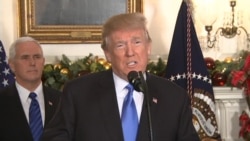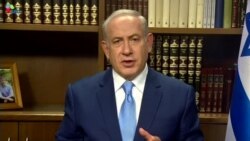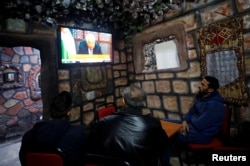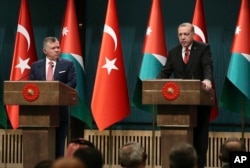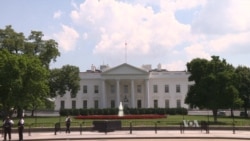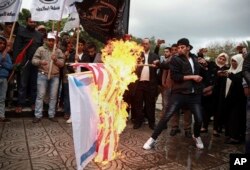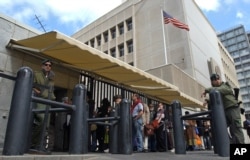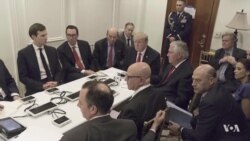Israeli Prime Minister Benjamin Netanyahu said Thursday he has no doubt other countries will follow the United States in recognizing Jerusalem as Israel's capital, and that once the U.S. Embassy moves to the city others will relocate there as well.
Netanyahu said his government is in contact with other countries, but did not name them as he delivered a speech at Israel's Foreign Ministry.
Israel's military announced the deployment of extra troops in the occupied West Bank as part of what it called its "readiness to possible developments."
WATCH: Trump on why he made the decision
The decision by U.S. Donald Trump to reverse decades of U.S. policy on Jerusalem and set in motion the process of moving the American embassy from Tel Aviv drew sharp criticism from Palestinian leaders.
Palestinian President Mahmoud Abbas said Trump’s plan is tantamount to the United States abdicating its role as a peace mediator.
Hamas chief Ismail Haniyeh called for a new Palestinian intifada, or uprising, against Israel beginning Friday.
"We want the uprising to last and continue to let Trump and the occupation regret this decision," Haniyeh said in a Thursday speech in Gaza.
Watch: Nethanyahu thanks Trump's decision
Trump announced the decision in a highly anticipated speech Wednesday from the White House Diplomatic Room.
"Today, we finally acknowledge the obvious: that Jerusalem is Israel’s capital. This is nothing more or less than a recognition of reality," Trump said.
"It is also the right thing to do. It’s something that has to be done. That is why, consistent with the Jerusalem Embassy Act, I am also directing the State Department to begin preparation to move the American embassy from Tel Aviv to Jerusalem," he said in the internationally televised 11-minute speech.
However, the president said, the move "is not intended in any way to reflect a departure from our strong commitment to facilitate a lasting peace agreement."
Trump added, "We are not taking a position of any final status issues, including the specific boundaries of the Israeli sovereignty in Jerusalem, or the resolution of contested borders. Those questions are up to the parties involved."
The president called on all sides to "maintain the status quo at Jerusalem’s holy sites, including the Temple Mount, also known as Haram al-Sharif. Above all, our greatest hope is for peace, the universal yearning in every human soul."
World react
Word of the decision has roiled the Arab world, raising the prospect of violence.
Even some of Washington’s allies in the region and elsewhere voiced grave concerns about the shift in U.S. policy.
Al-Jazeera television quoted Qatar’s foreign minister Sheikh Sabah Al-Khaled Al-Hamad Al-Sabah, as saying the embassy move would be a “dangerous escalation and death sentence for all who seek peace.”
Turkish President Recep Tayyip Erdogan and Jordan’s King Abdullah, meeting in Ankara Wednesday, called for an emergency meeting of the 57-member Organization of Islamic Cooperation.
Moving the U.S. embassy would “dynamite the ground for peace, igniting new tensions and clashes,” Erdogan said. He has threatened to break ties with Israel if Trump recognizes Jerusalem as its capital.
King Abdullah, underlining Jordan’s role as guardian of Muslim and Christian sites in Jerusalem, said ignoring the Palestinians and Christian rights in Jerusalem “would only fuel further extremism."
“It is imperative now to work fast to reach a final status solution and a peace agreement between Palestinians and Israelis, and this must allow the Palestinians to establish their independent state side-by-side with Israel and its capital in East Jerusalem,” Abdullah said.
Pope Francis issued a statement calling for the status quo for Jerusalem and urging "wisdom and prudence" to avoid bloodshed.
WATCH: In Controversial Announcement, Trump Recognizes Jerusalem as Capital of Israel
US political impact
The announcement follows Trump's campaign pledges to move the embassy to Jerusalem, a proposal backed by some of his Jewish and evangelical Christian supporters.
Aaron David Miller, who has served as a Middle East adviser to both Republican and Democratic presidents, expressed puzzlement at the timing of the decision. Speaking to VOA, Miller said it is hard to see the political benefits for Trump or the United States. “I can identify not a single U.S. national interest that is served, and serious downsides that are incurred by this move to relocate the embassy.”
Miller, now a vice-president at the Woodrow Wilson International Center for Scholars in Washington, said Trump’s decision is a textbook example of how to provoke fury in the Arab and Muslim world.
“It’s fair to say that if you wanted to create an issue in a laboratory that was designed to motivate violence, to play to passions, hatred and anger, Jerusalem would be the issue,” Miller told VOA.
Dalia Dassa Kaye, director of the Rand Corp’s Center for Middle East Public Policy told VOA it should come as no surprise that Trump’s decision would be broadly condemned. “Once again the United States is isolated globally with no clear strategic gain,” she said. “And it risks inflaming regional tension and increasing anti-American sentiment. The result is a boon for extremist forces and countries like Iran unfortunately.”
Embassy move logistics, security
Trump gave few details of the embassy move, saying only that architects were being directed to make the facility “a magnificent tribute to peace.” But officials have said it would likely take years to build.
Under a law signed by President Bill Clinton in 1995, the embassy must be relocated to Jerusalem unless the president signs a waiver every six months stating that moving the embassy would threaten U.S. national security. Every president since Clinton has signed the waiver, including Trump, who signed another extension Wednesday.
Given the potential for a violent backlash against Israel and American interests in the region, the U.S. Consulate General is restricting American government workers and their families from personal travel in Jerusalem's Old City and West Bank, including Bethlehem and Jericho, amid widespread calls for demonstrations.
In a statement following Trump's announcement, Secretary of State Rex Tillerson said the safety of Americans is the State Department’s highest priority.
WATCH: Trump Administration Maintains Commitment to Middle East Peace Amid Criticism of Jerusalem Decision
"And in concert with other federal agencies, we’ve implemented robust security plans to protect the safety of Americans in affected regions," he said.
Jerusalem is home to the Mosque of Al Aqsa, the third holiest place in Islam. It is also the site of several important Christian sacred places. For Jews, it is the Temple Mount, the holiest site of all.





